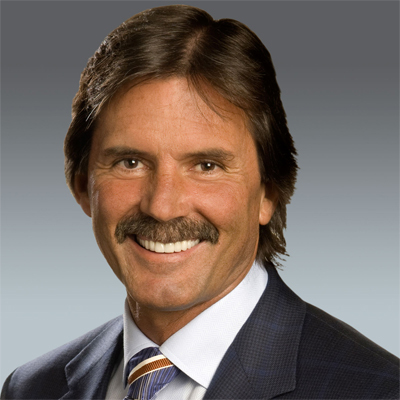In just about a month, Major League Baseball pitchers will report to Spring Training. That is always an exciting time for baseball fans. But, have you ever thought about the men behind the uniforms and the fears and obstacles they had to overcome to make it in the big leagues?
Oakland A’s legendary Dennis Eckersley is one who had to overcome some serious trials and we can gain tremendous insight from from this Hall of Fame pitcher.
I grew up a New York Mets fan, but Dennis Eckersley commanded a lot of attention from baseball fans everywhere.
Eckersley was simply one of the most dominating closers ever to have stepped on the mound. You couldn’t help but respect and admire his skills—even as you felt that sickening feeling as you watched him step in as a reliever to stop your favorite team in its tracks.
“Eck” was a natural. Drafted right out of high school, he made it to the big leagues by the time he was 20. His 23-year career (1975 – 1998) found him playing for the Cleveland Indians, the Boston Red Sox, the Chicago Cubs, the Oakland Athletics and the St. Louis Cardinals.
His accolades include American League Rookie Pitcher of the Year in 1975, a no-hitter against the California Angels in 1977, four saves in the Oakland A’s 1988 sweep of the Red Sox in the ALCS, a save in the final game to sweep the San Francisco Giants in the 1989 World Series, a season ERA of 0.61 in 1990, 1992 American League Cy Young Award and the League’s Most Valuable Player the same year. He was the first of only two pitchers in all of Major League Baseball history to record both a 20-win season and a 50-save season in the same career. Dennis was inducted into the Hall of Fame in 2004.
Interviewing a baseball star with a résumé like that was a great honor for me. Even as he spoke, I remembered watching this lanky, long-haired pitcher throw that signature “live” fastball that shut down hitter after hitter. But now, in his fifties, Dennis provided one of the most open and candid interviews I conducted.
Telling his story gave Dennis more than a chance to vent. More importantly, he wanted to relate his experiences in a way that offered hope to others that they, too, could overcome.
He spoke honestly about the dark times he lived through and how he finally moved forward into a much more peaceful sense of being.
Dennis recognized the importance of his father’s involvement at the beginning:
“I wasn’t a great player early on, but dad took the time to play with us. He was very involved and took the time to teach us. I always wanted to keep up with my older brother. That turned out to be a real benefit, because we had instant competition.”
He spoke openly about his personal life and how it affected him both off and on the field:
“I was married at 18, and it helped keep me in line—it kept me out of trouble. But when I was 22, things really got bad for me. I was traded to the Boston Red Sox and my wife left me for another player.
“I have to be honest with you: I was personally devastated. I was crushed when my marriage ended—so I put all my energy into my profession.”
He found his motivation and the drive to keep going in spite of his failed marriage:
“I had a little girl only two years old. I had to keep focused for her and her wellbeing.
“I tried to use what happened to me and turn it around to something positive. I kept a chip on my shoulder—and that helped keep me focused each day.
“I could have gone real bad, but I would not let it defeat me—no way, not me!”
With this same kind of remarkable honesty, Dennis shared his insights about his struggles with alcohol:
“I hit bottom shortly before the Cubs traded me to Oakland. I was in complete denial about my alcohol abuse. Believe me when I tell you self-denial is a killer!
“But I knew I had to do something different—alcoholism runs in my family I needed to get sober. My turning point was when I finally accepted the fact that I was an alcoholic.
“I was scared, but I turned to Alcoholics Anonymous and went into rehab for a while. So when I went to Oakland I was clean and sober.”
Gaining control over his drinking helped prepare Dennis to accept a major change in his career at Oakland.
“I had been a starter for twelve years, but my manager Tony La Russa and my pitching coach Dave Duncan convinced me to become a reliever. I accepted what they wanted me to do, and it was like being reborn.”
Dennis reflected on what made the difference in his life—how he was able to overcome the obstacles and become a big-league sensation. He spoke about his passion and drive, and how he turned fear into a positive force:
“I always had the passion for the game because I wanted to be the best I could. Therefore, doing the necessary things to prepare for the game was easy for me. I had that extra drive that separates successful people from others.
“I don’t know any great athlete who doesn’t have drive and a major passion—it’s a must.
“Being a relief pitcher is like always having to jump out of the plane to continue to prove yourself. I was a very anxious guy as a closer. The fear I felt came across as confidence, but deep down inside I was afraid to fail. Even highly talented people question themselves.
“People are held back from reaching their goals because of their fear of failure. They get tentative—and that doesn’t work. You have to truly believe in yourself. You can’t fake it.
“Fear motivated me. Fear made me better. The thought of not doing well got my attention, so I always kept the pressure on myself. Even when I was inducted into the hall of fame, I didn’t think I deserved it.”
But others did. In 2005, the Oakland Athletics officially retired Dennis Eckersley’s uniform number (43). Fremont, California’s Washington High School, his alma mater, renamed its baseball field in his honor. He was named to the Major League Baseball All-Century Team, and was inducted into the Hall of Fame in January 2004.
Upon retirement Dennis had appeared in more games (1,071) than any previous pitcher in MLB history, recording 390 saves.
Dennis is one of those remarkable successful people who picked up the pieces and rebuilt his life on more than one occasion. And as we finished up our conversation, I thanked him for his openness and honesty in sharing his life story. He offered his parting thoughts about his message of hope and overcoming:
“Beyond your goals, enjoy the memories of your life and appreciate the moment.
“The way to live is to be honest within yourself so you can make clear decisions.
“My advice to others is about acceptance in your life. When things happen to you, do all you need to do so you’ll have no regrets. No half-steps, go all in. Give it all you have.”
What areas in your life are holding you back from being the best you can be?

